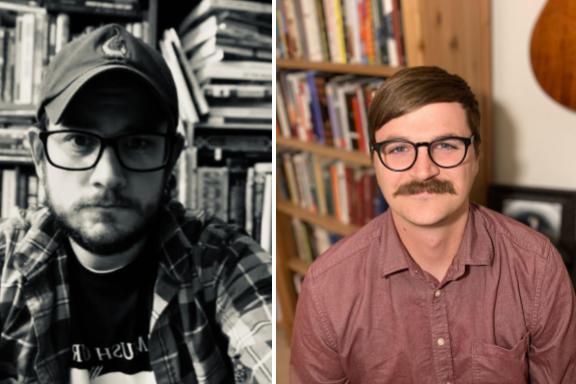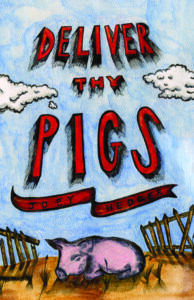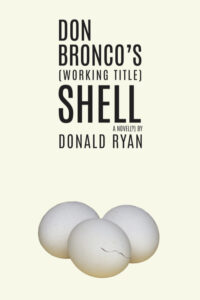I first met Joey Hedger in a “book club.” In late 2021, Malarkey Books announced their 2022 lineup: one book per month for a year—or, the Malarkey Book Club. Joey’s Deliver Thy Pigs was slated for a spring release. Mine, Don Bronco’s (Working Title) Shell, the fall. Thus began the natural progression of Twitter following and group chats and Zoom readings to long, goofy threads on social media for the world to see.
Maybe it was the openness of this budding friendship. Maybe it was the thrill of uncertainty (as there’s no guarantee a book won’t disappoint). But Joey’s book was next on my TBR pile, and I got to thinking about breakfast. Bacon and eggs. Pigs and shells. Something was brewing like a pot of coffee.
I reached out with my intention to start Deliver Thy Pigs accompanied by a potential interview; the catch, however, being that this interview would begin while reading, not after. And layers formed. What of a dual interview? I sent him an early PDF of the yet unreleased Don Bronco’s (Working Title) Shell.
The following is a glimpse at emails sent between August and November 2022.

Donald Ryan: I finally started Deliver Thy Pigs and told a coworker this morning I can’t remember the last time I read an opening chapter and knew I was going to enjoy the shit of the book. Fun things happen, nothing particularly wild, but peculiar things. But it’s how you introduce Marco Polo, Susan, and Dave, with their little oddities implying so much more to come. Add to this the writing, pacing, humor, and descriptions—like describing the restaurant as a stomach—damn! I know I’m in for a treat.
So far, the book deals heavily with smell, the scents of pigs and death, because the setting, Prairie Ridge, is home to a meat processing plant. What inspired this?
Joey Hedger: Highlighting the setting is fitting because that’s where Deliver Thy Pigs all started. I originally thought it would be a short story. It was aimless, mostly just Marco Polo bringing his b.b. gun to the bridge and shooting out the slaughterhouse’s windows. I kept adding more and more until I realized I had something bigger. But I chose a slaughterhouse as the catalyst because of how mysterious it felt.
In America, so many of our public experiences are buried behind things meant to stay hidden, like food. Kitchens are ugly and stressful places, so we typically don’t let you (the customer) see them. We’re only meant to get the nice-looking end product. Slaughterhouses are the same way. We want meat without violence, want to pretend that there’s no in-between from cow to package of ground beef. For me, all someone needs to do is open a window to a place like that and let me peer inside, and I’m intrigued. I also wanted to focus on the humanity of it all, because, to me, the slaughterhouse isn’t just a slaughterhouse; it can be any factory or any place that abuses its employees or causes destruction at small or large scales. It’s also a perfect story villain, because as a vegetarian, there’s conflict there that interests me. And the horrible smell that pervades the town, in this case, is sort of the opening of that window, looking in and getting a whiff of the grossness inside. But it’s also about how much we’re willing to bear before something gets too heavy to handle.
The town itself is based on my wife’s hometown, which is also a bizarre little Chicago “suburb” that’s in reality so far from Chicago going to the city is really just an inconvenience. People have a weird relationship with nature there. It’s mostly just cornfields and suburban neighborhoods, but you’ll occasionally catch hints of gorgeous prairie landscapes sandwiched between.
Immediately upon starting Don Bronco’s (Working Title) Shell, I noticed a similar theme of food. In your case, food seems to act as a means of order. Your “protagonist” Zeek orders the same meal at the same restaurant each day, he rides the bus, he goes to work, he gets home, watches TV. It’s all part of this attempt at maintaining order, which then starts getting broken down by the introduction of eggshells. I do have so many questions, but I’ll start by ping-ponging yours back and asking what inspired your book? It approaches themes of unreliable narrators and untrustworthy realities. What drew you to write about that?
I came from the restaurant business. Spent over a decade cooking everywhere from sports bars to fine dining. Then I lucked into (or put into the universe by threatening during every rush I was going to go work for “a fucking library”) picking up a part-time spot at a small-town library a few days a week before the dinner shifts. Once in, I never looked back. So believe me, the way you describe kitchens as ugly, stressful places is spot on.
I guess, too, that plays into the theme of food. Because I love food. Always have. Love to eat. And especially now I’m not in kitchens and cooking is a hobby enjoyed by my family rather than hundreds of covers, I have a renewed love for it. But also, when I started Don Bronco, long before Don Bronco was Don Bronco, I was working two restaurant jobs. All day every day. So it definitely crept into the story. But it was meant to. I littered the entire novel with things I’d interacted with at the time of writing, from something overheard to a movie watched—a piecemeal of observations. In this way, the story became a study of what influences creativity. A search for where ideas come from.
However, it’s not what inspired the book. The honest answer’s also the lamest: One morning I decided to write a novel. I had some short stories, essays, and poems published but never managed to complete anything larger. So I wrote the line “Zeek found the first piece of eggshell in his omelette,” with no plan other than seeing where that phrase took me. So all the first eggshells to be found, like Zeek, I had no idea what they meant, if anything. Until about thirty pages in when I realized this too was on track to not being a novel. This was about when Don Bronco weaseled himself in by way of, going back to what inspires inspiration, my fascination with metafiction and being overwhelmed with all the “rules” there are for writing. My goal became to take all those rules, those shoulds, musts, and inspirational quotes, and simultaneously use and blatantly break them.
I really like the duality of this, the initial stages of creation. How this process works. How you noticed something growing larger from the single scene of Marco Polo with his b.b. gun against my realizing if I didn’t dig I’d have just another short story. It’s interesting, all these endless possibilities and means to build something from nothing.
Deliver Thy Pigs starts out with an act of vandalism. And even the setting has been vandalized through pollution in the river and the smell of the air. Did you know early on vandalism would take on a prominent role? Or did this sneak up on you as the narrative expanded?

I was interested in vandalism because my book largely is about change, especially change of people’s points of view, which is a function of vandalism—changing things. Prairie Ridge is a small town where everyone follows the same day-to-day rhythms. Odd things happen that nobody really notices because they’re so used to it. Everything smells like rot and death. Even birds drop out of the sky.
Marco Polo’s activeness is significant, too. He hates the town and always wanted to leave and travel but couldn’t, so his vandalism reflects that. Midway through the book, he sets free a bunch of caged pigs. Breaking out of his monotonous grief after his dad’s death, he shoots out a window (or, a narrative lens/perspective) and starts becoming a more active character. Susan and Margaret (especially Susan) use vandalism to change the town, because Susan loves the environment so much and keeps having these visions about the town getting swallowed back up in native trees and foliage. One of their more significant acts against the slaughterhouse is filling the streets with red chalk messages, another “change” of environment. June also gets introduced as an outsider perspective, to break apart that singular way of looking at things (she’s not from the Midwest, cannot smell, tries to swim in a polluted river that nobody touches).
I originally hoped to write Deliver Thy Pigs as a comedic Exodus story, where each “act of revenge” translates roughly to the plagues in Egypt. The poison ivy is a riff on the boils. Dead cattle; pork guts. Water turning to blood; red street chalk getting rained on. Susan sees things through this religious point of view, so she views her own actions as symbolically significant. At one point, she gets excited about “bugging” the factory manager’s office, because it reminds her of locusts.
Glad you mentioned the comedic Exodus. I wanted to ask something about the biblical references, but it seems you answered a yet-asked question much clearer than any question I might have posed. How you added the “plagues” is so expertly done: It’s all right there, all so obvious, yet it slipped right by. I find a lot of joy in experiencing those “Ohhhhh” moments in art. It’s like I’m now in on the joke, part of the club.
How’d these plagues get worked in? Did you lay out the path where you as the author manipulated the characters into meeting? Or did you write out some scenes and notice the theme organically building and layer from there? Or—well—what am I trying to say here: I’m interested in the process of things, too. Having seen the result, I’m curious to the how of creativity. There’s always that aha moment. But at the same time, it’s all so messy; or, well, for me it is.
I hadn’t planned on adding the biblical references and religious components until I wrote that scene about Susan Banks trying to cast demons out of pigs. Admittedly, I probably had that Flannery O’Conner story, “Revelation,” (where it ends with the woman hosing down the pigs) in mind when I wrote it. I added that scene because I thought it was funny, but then realized that she was filling the prophet role, the one who keeps seeing visions of the factory swallowed in trees. So the religious aspects flow out of her perspective, in my mind, however vague and disconnected they may be. Other people have also helped me notice correlations in the text. A friend recently pointed out the significance of the color blue in the last line, as it offsets the redness of the blood and slaughter and fire. I love when people tell me things about my book. There’s certainly intention there, but I lean toward the mindset of the reader being an active participant in the creation of a story.

I love how untrustworthy your book is. Things start falling apart early. Near the beginning, there’s a line, which turns from black to blue font, then the book stays in blue font for I-don’t-remember-how-many-pages. The line reads, “The metal clanked against the plate, breaking the placid atmosphere of the breakfast bar, an unwelcomed reminder of the chaos the day would bring.” Don Bronco’s is all about things breaking and falling apart, and, at different intervals, the broken pieces (i.e., the eggshells Zeek finds) start revealing things, like the letters of other character’s names. Just when I think it’s going to be a scavenger hunt, even that plot gets broken apart.
There’s a lot of implications as to the layout of this book. What have those conversations looked like during production? Did you go in with a very clear vision of what it needs to look like? Or was that explored later on in the process? Also, I love how you name your characters: Ron Way. Don Bronco/Donald Ryan. Zeek, full name Ezekiel. Matte (with an e). Shellie La Dop. There’s sort of a truth/untruth approach to naming things that keeps drawing me in. I don’t know who to trust, yourself included. Besides certain allusions to the author or to shells, how did you approach naming your characters?
To me, Don Bronco is a collage, and not just on the page but in how it got to the page. There wasn’t a central idea beforehand. The blankest of blank pages. Then it began existing; like the note’s justification of left, center, or right became organic based on what Don Bronco was recording. I think typesetting this thing damn near broke Alan; once I had something in a place that’s exactly where and how I needed it to be. And the names—ha—they too followed this notion of making a collage of where creativity stems: Ron Way sounds like wrong way. Not sure where Zeek came from, or the Ezekiel correction, but it worked so well with Zeek not being who Don Bronco wants him to be, I went back and worked it in. Matt is twofold in that there’s been a Matt at nearly every job I’ve ever worked and there’s so many different ways to play with the word matt(e). Other names were as toyful as playing with name generators and google translate. And the scene where Don Bronco finds the dog at the shelter with his name is so borderline true (the borderline being the dog’s name was actually Dan Bronco). Yes, messy. But what is life if not small beauties in mundane things?
But after all that I guess I could have just asked: Do you outline? And/or would you say you have a process? Or routine?
I find beginnings and endings the most enjoyable parts of a story and sometimes the easiest. I mentioned that I wrote the first chapter not knowing what it would be? Well, a couple chapters in, once I had all the characters and built out the town a bit, suddenly I had the ending, which reads almost as an epilogue. I could envision where I wanted the town to be and what had happened, good or bad. Then I sort of plotted out the rest. In some notebook, I just listed out a bunch of “events” that could happen that would help drive the story forward, because “escalation” was key in how Marco Polo and Dave responded to each other. Then I sprinkled in more and more until I had something that felt naturally connected.
It’s fascinating to me that you’re interested in the process of my writing Pigs, because Don Bronco’s is clearly about process. One thing that struck me about three-quarters of the way through was how you use various methods of art/creation to frame the writing process. Throughout, you add quotes, add notes, go on tangents, add jokes, but also you critique yourself, then pair the writing process with food recipes, painting, etc. I thought it really clever how you portray a process that seems to have very little control over the plot or even the process, and I almost saw the recipes, et al., as an attempt at control, an attempt at understanding what is necessary to make something good, but they’re also distractions, influences, life-going-by-while-trying-to-create. Don Bronco’s feels almost like an anti-craft book—not looking to inform, but looking to deconstruct what it means to write.
You really have created quite a masterpiece. The egg itself was a really interesting through-thread, because it comes across as simple, but somehow becomes deeply woven into the theme, plot, symbolism, etc. It’s at once an undoing, but also a new birth for Zeek as well as Don Bronco. It also feels like a dome, a la The Truman Show.
Your novel seems heavily aware of where it sits within pop culture. You described it like a collage, which is really fitting. It’s got lyrics, short stories, poems, quotes, movie references. Really everything. It’s witty and referential. And you clearly have a strong interest in different forms of art. Do you want readers to think of it as a novel or something more or less different? I guess, what I mean is that reading Don Bronco feels more like an experience than text. How do you want people to experience your book?
As you seemed to have noticed: I like an experience. Because life is an experience we all have while simultaneously taking mostly for granted. Yet the vast majority of the time it isn’t grand. So creation for me—whether it’s writing or painting or photography—stirs my non-creating hours into noticing these simple, overlooked beauties life offers. Although, wow, really starting to come off as pretentious. Yeah, yeah, shit like sunsets and whatnot are definitely included, but also electricity at night can look stunning, or you overhear something so absurd you’re unsure how it made its way into a conversation, or you have a thought that passes unshared but for those few moments you amuse yourself into a smirk.
So how do I want people to experience the book? I hope they enjoy themselves. And I hope they get caught a bit off guard. And with the structure I want people to say it’s X but also not X with moments of WTF followed pages later with a realization oh, here’s TF. This question’s hard. I never thought it’d be published, so I’m just glad (and nervous) people seem to want to read it.
I loved it very much. There’s a real physicality to the design. Clearly, you had a plan for the design and layout, but did you envision people holding it when you wrote it? How’d that conversation happen with Alan? I sort of wish I could see the email where you said, “Hey, all the text on pages xx to xx needs to be blue!”
Alan accepted the blue ink going in. I think my first email in response to his interest said something like, “Are you sure? You saw all the blue words, right?” And he said Malarkey would make it work. I’m so glad, too, cause it couldn’t have found better, more trusting hands. I put the words all over pages, but what people see when they read it, that love is all Malarkey.
Speaking of love, I too love when people tell me things about my book, and I would have never thought of it as an anti-craft book. Ha! But now that’s hands-down my favorite description. I find this especially interesting in light of your process. How your creative meandering set up an envisioned ending and then plotting to connect the dots. Ah, that little word “plot.” How it eludes me. But I guess that comes through, how you point out the “process that seems to have very little control over the plot or even the process . . .” The character Donald Ryan in the book isn’t me. But that observation very much is.
I really like how you described creating as a way to notice things, because the act of noticing seems to be one of the driving factors of your book. Both with Zeek noticing eggshells and oddities happening across town and putting his own names to things, then Don Bronco noticing Zeek and using attention to inspire the process of writing. “Noticing” is one of the more tangible outcomes of writing, in my opinion. Around when Pigs was released, I wrote an essay that asked the public, “What does your town smell like?” And people actually responded(!) and told me about the odd, gross, or good smells in the air where they live. I got to learn all sorts of things and feel like I contributed somehow to their experience of their environments by simply asking that question. I really hope that anyone who reads my book thinks of it anytime they encounter a slaughterhouse!
Donald Ryan solely exists online dot com, @dryanswords. Don Bronco’s (Working Title) Shell is his first novel.
Joey Hedger is the author of the novel Deliver Thy Pigs (Malarkey Books) and the chapbook In the Line of a Hurricane, We Wait (Red Bird Chapbooks). He currently lives in Alexandria, Virginia, and his writing can be found at www.joeyhedger.com.
This post may contain affiliate links.







